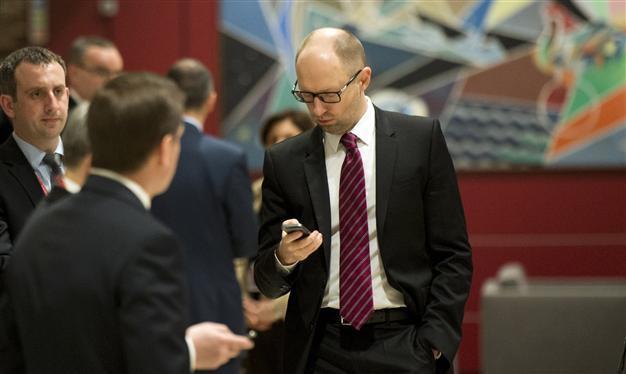EU, Ukraine sign political provisions of historic accord
BRUSSELS - Agence France-Presse

Ukrainian Prime Minister Arseniy Yatsenyuk, right, checks his cellphone as he walks in the corridor at an EU summit in Brussels on Friday, March 21, 2014. A Photo
Ukraine interim prime minister Arseniy Yatsenyuk put his country firmly in the Western camp Friday, signing the political provisions of a landmark association accord with EU leaders in defiance of Russia.
"This gesture symbolises the importance both sides attach to this relationship ... and the joint will to take it further," EU president Hermann Van Rompuy said.
The EU was offering Ukraine its "steadfast support," Van Rompuy said, promising help to get the country's struggling economy back on track.
"We are sure that together we will succeed," Yatsenyuk said after the European Union's 28 heads of state and government signed their names to the deal.
The accord, years in the making, was suddenly ditched by Ukraine's pro-Kremlin president Viktor Yanukovych in November. It was this that sparked protests leading to his fall last month, setting off the worst East-West crisis since the end of the Cold War.
The political provisions of the 'EU-Ukraine Association Agreement' cover shared democratic values, improved economic ties, judicial reform and other aspects of civil society.
Europe's leaders have agreed to press ahead with signing the full accord and an accompanying free trade agreement, likely after Ukraine elections on May 25, as they seek to bolster Kiev against a newly-assertive Russia.
As if on cue with Friday's signing, Russia's upper house of parliament voted unanimously to ratify the treaty incorporating Crimea into Russia, following a similar vote Thursday in the lower house.
The annexation of Crimea saw the EU join the United States Thursday in imposing sanctions on high-ranking Russian figures.
President Barack Obama blacklisted 20 Russian lawmakers and senior government officials, in addition to 11 already targeted, and warned Moscow faced international isolation if it did not reverse course.
Among those named were top businessmen close to Putin such as billionaires Gennady Timchenko, Arkady Rotenberg and Boris Rotenberg.
After long talks in Brussels, EU leaders hit 12 more Russians and Ukrainians with travel bans and asset freezes, bringing their list to 33. The new names will be announced later Friday.
The 28-nation bloc also cancelled an EU-Russia summit planned for June and called for the dispatch of international or EU monitors to Ukraine.
Moscow responded in kind, announcing sanctions against nine US officials, including top political figures and presidential aides.
But on Friday, Putin appeared to offer a time-out, saying Moscow would hold off on further tit-for-tat sanctions for now.
"I think we should for now hold off on reciprocal steps," Putin told a meeting of his Security Council, at the same time dismissing the EU and US sanctions as a joke.
The fallout from the Ukraine crisis continued Friday when Fitch joined fellow ratings agency Standard & Poor's in downgrading Russia's credit outlook to negative from stable because of the growing risk of Western sanctions.
"Since US and EU banks and investors may well be reluctant to lend to Russia under the current circumstances, the economy may slow further and the private sector may require official support," Fitch said.
Many EU nations are heavily dependent on Russian oil and gas and so the bloc is divided on how far it can go in cutting economic ties with one of its largest trade partners and key energy supplier.
EU efforts to diversify energy supplies after Russia cut deliveries to Ukraine in 2006 and 2009 have so far failed to make much headway.
Russia fired another warning shot on this front Friday.
The Kommersant business daily said that when Moscow and Kiev revise their agreement on the Crimea base for the Black Sea fleet, Ukraine could lose the lower price it got in return for the 2010 accord.
If Kiev loses its $100 discount, it will end up paying up to $480 per 1,000 cubic metres for natural gas, the highest price of any of gas giant Gazprom's clients in Europe, the newspaper said.
A gas price hike of this order would be a huge blow for Ukraine and likely add to tensions.
The International Monetary Fund said meanwhile it had made "significant progress" in talks with Kiev over the resumption of a vital support programme.
Japan also plans to provide nearly $1.0 billion in aid to Ukraine, reports said, while the EU has announced funding of 11 billion euros in all.
On the ground in Crimea, Russia continued to consolidate its position, with Kiev preparing an evacuation plan for thousands of Ukrainian soldiers and their families based there.
The interim Ukraine government fears that Moscow may venture into the eastern half of the country, home to a large Russia-speaking population, on the pretext of protecting Russian compatriots.
Yatsenyuk said earlier that Ukraine would "respond firmly, including through military means," if Russia took that option but on Friday he put the stress on the need for economic sanctions.
A "military response is not acceptable... (that way we) have a third world war," he said.
"The best way to contain Russia is to impose real economic leverage on them," he said.
Washington said Thursday that Russian Defence Minister Sergei Shoigu had promised his US counterpart Chuck Hagel that Moscow would not move into eastern Ukraine.
